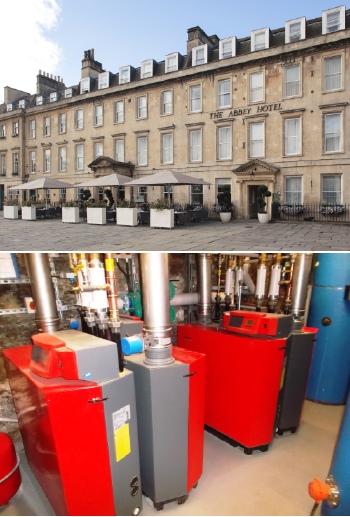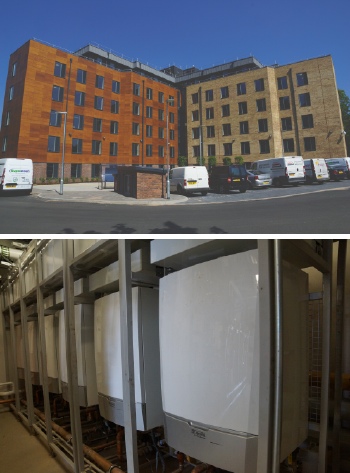The bridge to decarbonisation for heating buildings

With calls for the Government to prioritise the decarbonisation of heating over the next decade, James Porter of Remeha discusses the role of the condensing boiler.
In the year of the general election, one subject on which all UK political parties are in agreement is the need to dramatically reduce our energy use and harmful greenhouse-gas emissions. While our long-term goal for decarbonisation is clear, how we go about achieving our steep targets is less well-defined.
Heating is a large user of energy, accounting for almost half the total energy consumed in the UK and around 30% of the greenhouse gas emissions produced by buildings. However, the path to decarbonising heat for buildings is not straightforward.
The first obstacle is the UK’s high percentage of inefficient existing building stock. Here, a significant proportion of the heating is provided by commercial boiler plant. Often, the nature of these buildings and the existing heating systems in place will exclude the use of low- to zero-carbon renewable heating systems, leaving retrofit as the only immediate solution.
The second barrier is financial. The UK economy might be starting to grow, but we are not out of the water yet. Businesses and organisations operating on a tight budget may not have the necessary funds to invest in the more expensive renewable technology, despite being keen to improve the performance of their buildings.
 |
| Following the installation of Remeha’s 210 Eco Pro boilers in this 18th-century Hotel in Bath, energy savings of up to 40% are expected — amounting to up to £10 000 a year. |
Manufacturers have responded to the challenge for higher heating efficiencies and reduced carbon emissions with a wide range of sophisticated renewable technologies and new generations of traditional heating equipment. This combined approach of increased uptake of renewable products and improved energy efficiency is pivotal in moving the nation towards a more energy-efficient, low- to zero-carbon future. More specifically, for our existing buildings it is the latest models of high-efficiency gas-fired condensing boilers that will play a critical part in helping effect the transition to more sustainable heating.
Upgrading to modern, high-efficiency condensing boilers can, quite simply, transform the energy performance of our existing buildings. This is underlined by the Energy-related Products (ErP) Directive that will be introduced later this year. The ErP brings new EU eco-design and energy-labelling regulations on heating and water-heating products that are intended to raise energy-efficiency standards for boilers and heaters, encouraging the use of condensing boilers. By raising the thermal efficiency, new-generation condensing boilers can help the operators of buildings operators meet their environmental obligations whilst making significant savings in operating costs, with rapid financial payback.
There is no need to wait to reap the energy-saving rewards, as many manufacturers already supply condensing boilers that offer the higher efficiencies required by the new regulations. The Carbon Trust suggests that energy savings in the region of 30% are achievable when replacing an existing boiler with one of these new-generation models, although in our experience this figure can rise as high as 50% according to the nature of the boiler being replaced — with a corresponding cut in harmful emissions.
Retrofit aside, the condensing boiler also has an essential part to play in new-build developments, either as the sole provider of heat or operating alongside low-carbon technologies, such as gas-fired absorption heat pumps or biomass, to supply seasonal top up or meet peak demand.
The flexible nature of the condensing boiler contributes further to its popularity, enabling the addition of energy-saving ‘bolt-on’ technologies to maximise savings. One such ‘bolt-on’ device is passive flue-gas heat recovery (PFGHR) technology that can lift the efficiency of the boiler by a further 10 to 15% and make it ‘super condensing’. It works by recovering otherwise wasted energy and passing it back into the system for the benefit of cold water pre-heat or space heating, thereby reducing the energy demand of the building and lowering bills. On retrofit applications, a ‘super-condensing’ boiler brings significant energy savings as it can achieve maximum condensing efficiencies, even at high flow and return temperatures. On new build projects, ‘super-condensing’ boilers are increasingly regarded as a cost-effective, greener solution to the low-carbon requirements of Building Regulations, offering rapid financial payback.
 |
| Up to 15% of the gross energy input to the Remeha Commercial boilers in the Talybont Gate student accommodation of Cardiff University is recovered by passive flue gas heat recovery. The energy is used to heat the two 2000 l DHW cylinders. |
Technological advances, together with the adaptability of the condensing boiler, make it a crucial building block in today’s multiple-component heating systems. Some manufacturers offer ‘renewable ready’ models that optimise seasonal efficiencies on bivalent heating systems that combine renewable equipment and condensing technology. Bespoke bivalent heating solutions are also growing in popularity as they can be tailored to meet the individual requirements of a building to maximise savings for the end-user.
Effective, highly efficient, reliable and flexible, condensing boilers remain one of the most effective energy-saving heating technologies available today and will continue to play an important pivotal role in heating in the future.
For the end user, they provide a proven solution to reducing energy demand and give a high return on energy-efficiency investment. On a national level, these clean-burning condensing boilers will help to meet our carbon-reduction targets, protect our energy security and halt climate change. As the Government prepares policies for the future decarbonisation of heat, condensing boilers will remain a beacon of energy-efficiency, the bridge to a zero-carbon future.
James Porter is business development manager at Remeha Commercial.







